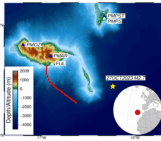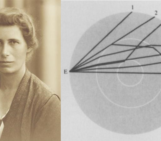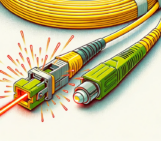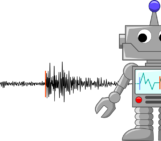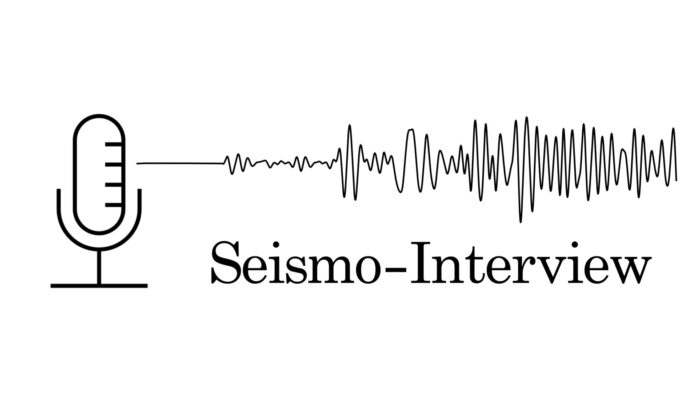
At EGU’s GA this year we managed to catch up with Dr Alice-Agnes Gabriel, Associate Professor at the Scripps Institution of Oceanography, University of California, and the new head of the Seismology Division. Over the interview she gave us insights into her relationship with seismology over the years, what she hopes to achieve in her new position, and how EGU can stay relevant into the future. Let’s get started!
What led you to pursue a career in seismology?
“Good question” says Alice, who studied physics, then a diploma (master’s) thesis in theoretical material science and semi-conductors, which she says was “pretty far from seismology, but I got a scholarship (DAAD) to go to New Zealand for one year.” On Alice’s antipodean adventure she was taught about “geology, fossils, and geophysics, eddies, turbulences” and surrounded by “a lot of amazing geology, really deforming and shaping the continent.” This was where her interest in Earth Sciences began!
Looking for something “with a little more societal impact than developing a new chip”, Alice pursued a PhD in earthquake physics. “I was interested in how rocks slide” says Alice, as well as asking “what can we learn about what happens at the source of seismic waves.” This provided a good connection between theoretical material science and seismology, “but I had a lot to learn about it!”
What interests you in Seismology at the moment?
After Alice’s seismology origin story, we wanted to know about what she was interested in right now. “I am a very computational-oriented scientist” says Alice, and currently the most exciting development for her is that of exascale supercomputing. “We are just at the verge of having the new generation of very, very large supercomputers,” Alice explains. She elaborates on the recent advancements, stating, “at the same time, there is a lot of movement towards democratizing high-performance computing. With cloud computing, it just makes it easier for everyone to access a very large computational infrastructure.” Alice emphasizes the significance of this breakthrough for her field, adding, “The chips you have in your phone are at the moment the same, energy-efficient hardware that is in some of the largest computers, so something that is really exciting is to work towards our community having access to this infrastructure. Geophysics and seismology can benefit from using modern technologies.”
What are your goals as the head of EGU Seismology Division?
Moving on to her responsibilities spearheading the Seismology Division, Alice shares her concerns, “One of the most pressing issues is that we had zero nominations for medals this year, so that is something that just emerged as a top priority to change.” She urges us all (note to the reader: that’s you!) to participate actively, emphasizing, “Especially for the Early Career awardees, it is very simple to nominate a colleague; you just need a half of page, no letters, it’s very, very easy.”
Why is the EGU an important and relevant organization?
Alice passionately speaks about the EGU, stating, “We are the largest association unifying earth scientists in Europe.” She points out the relevance of Earth sciences to current global issues, saying, “I mean, most of the topics in the news are related to Earth science; if it’s climate change, renewable energies, even if it’s conflicts that are related to fights about borders, about resources, it is important to understand that our field is really one of the most important fields in bringing science into all of these discussions.” Alice sees geophysics as a critical area of study for our future, affirming, “Geophysics is really a very important scientific discipline in shaping our next decades in how we want to live.”
As the conversation shifts to engaging the public with science, Alice acknowledges the need for improvement, expressing, “I think we can obviously do better job with that, personally I try to use social media a lot; I try to communicate science.” She highlights the significance of proactive engagement, stating, “It would be really important to also comment before a terrible disaster happens, to talk about preparedness, and to talk about how science can help us to do better in everyday life: how to better prepare for geohazards, how to do better in using energy responsibly”, and she emphasizes that instead of being asked all the questions after the fact, as scientists “We need to be continuously in exchange with the public and not just reacting.”
Finally, even though last year was also already great, Alice expressed how good it was to see so many faces this year at again a real in-person EGU. Nevertheless, the hybrid variant is still present and makes the EGU GA more accessible to everyone.
We want to give a big thank-you to Alice-Agnes Gabriel, and we wish her a great term as Seismology Division President.
Want to hear more from Alice-Agnes Gabriel? Follow her on Twitter @InSeismoland
This interview and this blog was produced and co-edited by all members of the ECS team.

